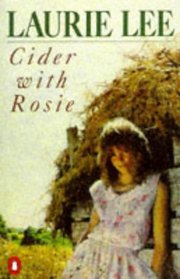Helpful Score: 1
Moving and poetic, Cider with Rosie is part memoir, part chronicle, part song to life itself. Laurie Lee recalls his growing up years in a remote Cotswold village in England just after the first World War. Never maudlin, never sugar-coating the more brutal aspects of the time, he nevertheless evokes a longing for the days when a village became an entity unto itself, composed of its inhabitants but also having rules and rhythms of its own.
\"I remember, too, the light on the slopes, long shadows in tufts and hollows, with cattle, brilliant as painted china, treading their echoing shapes.\"
Cider With Rosie is a wonderfully vivid memoir of Laurie Lee\'s childhood and youth in a remote Cotswold village. From the moment he is set down in the long grass, \"thick as a forest and alive with grasshoppers,\" he depicts a word that is both tangibly real yet belonging to a now distant past.
About the Author
Laurie Lee was born in Stroud, Gloucestershire, in 1914, and was educated at Slad village school and Stroud Central School. At the age on nineteen he walked to London and then travelled on foot through Spain, where he was trapped by the outbreak of the Civil War. He later returned by crossing the Pyrenees, as described in his book As I Walked Out one Midsummer Morning. In 1950 he married Catherine Polge and they had one daughter. Laurie Lee died in May 1997. In its obituary the Guardian wrote, \"He has a nightingale inside him, a capacity for sensuous, lyrical precisions.\"
Cider With Rosie is a wonderfully vivid memoir of Laurie Lee\'s childhood and youth in a remote Cotswold village. From the moment he is set down in the long grass, \"thick as a forest and alive with grasshoppers,\" he depicts a word that is both tangibly real yet belonging to a now distant past.
About the Author
Laurie Lee was born in Stroud, Gloucestershire, in 1914, and was educated at Slad village school and Stroud Central School. At the age on nineteen he walked to London and then travelled on foot through Spain, where he was trapped by the outbreak of the Civil War. He later returned by crossing the Pyrenees, as described in his book As I Walked Out one Midsummer Morning. In 1950 he married Catherine Polge and they had one daughter. Laurie Lee died in May 1997. In its obituary the Guardian wrote, \"He has a nightingale inside him, a capacity for sensuous, lyrical precisions.\"




